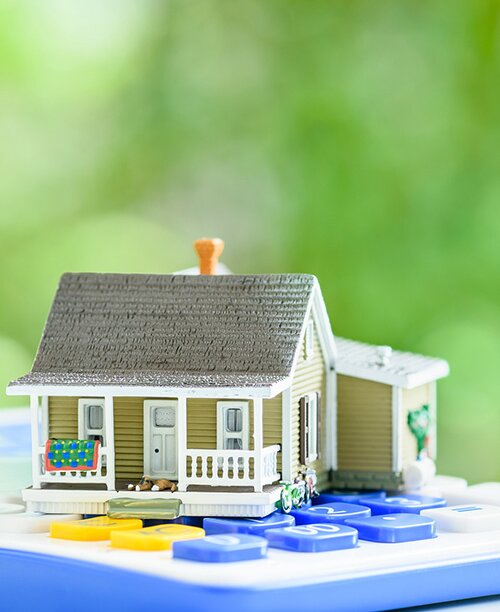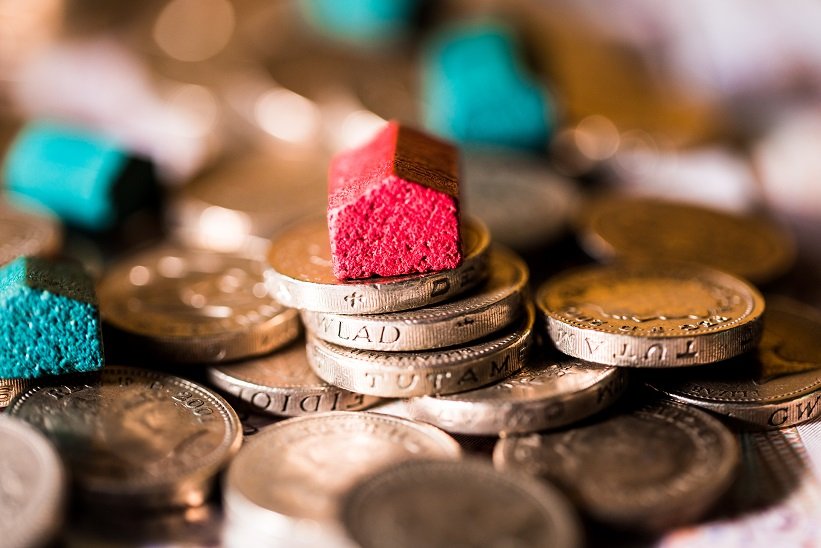Filing for bankruptcy can be a life-changing event, but it doesn't have to be the end of your homeownership dreams. While it may be more difficult to get a mortgage after bankruptcy, it's not impossible. We discuss all you need to know about getting a mortgage after bankruptcy in this guide, from how long you'll have to wait to how you can improve your chances of approval.
The Topics Covered in this Article Are Listed Below:
- What Is Bankruptcy?
- How Does Bankruptcy Affect Your Credit Score?
- Can I Get a Mortgage After Bankruptcy?
- How Long After Bankruptcy Discharge Can I Get a Mortgage?
- Which Mortgage Lenders Accept Bankrupts?
- How Much Deposit Will I Need After Bankruptcy?
- Can I Apply for a Mortgage if I'm Still Bankrupt?
- Do I Need to Tell Lenders I've Been Bankrupt After 6 Years Have Passed?
- Can I Get a Buy-to-Let Mortgage After Bankruptcy?
- What if I've Had Other Credit Issues After Being Bankrupt?
- How Can I Make Sure I'm in the Best Possible Position to Apply for a Mortgage After Bankruptcy?
What Is Bankruptcy?
Although the word "bankruptcy" often has negative connotations, it’s actually a legal process that can provide relief to individuals and businesses who are struggling with debt. In general, bankruptcy allows debtors to restructure their finances and repay their creditors over time. There are several different types of bankruptcy, each of which has its own advantages and disadvantages.
How Does Bankruptcy Affect Your Credit Score?
One of the biggest concerns for people considering bankruptcy is how it will affect their credit score. Bankruptcy will likely result in a significant drop in your credit score and can stay on your credit report for up to 6 years. Nonetheless, it's important to keep in mind that your credit score is just one factor that lenders look at when considering a loan application. In addition, your credit score will gradually improve as time goes on and you continue to make timely payments on your debts. So, instead of focusing solely on the impact on your credit score, consider the following questions as well: will bankruptcy affect your dream to own your own home and can you get a mortgage after bankruptcy? Read on to find out.

Can I Get a Mortgage After Bankruptcy?
The good news is that, yes, you can get a mortgage following bankruptcy, but it essentially comes down to how long you’ve been discharged. If you’re discharged from bankruptcy, this means you’re freed from any debts that were included in your bankruptcy.
At John Charcol, we can help people with bad credit get mortgages including those who have been discharged from bankruptcy. Our mortgage experts have the knowledge and experience necessary to find you a suitable mortgage.
How Long After Bankruptcy Discharge Can I Get a Mortgage?

So, how many years after bankruptcy can you get a mortgage? Unfortunately, you can't apply for any type of credit, including a mortgage, until you have been discharged from bankruptcy. This will generally take around 12 months, although it may be less depending on the court's judgement.
Each lender has different criteria regarding applicants who have been discharged from bankruptcy. Some adverse credit lenders will consider applicants with a discharge of 1 – 3 years, although these lenders will charge higher rates and may require a bigger deposit.
Some high street lenders will consider applicants with a discharge of 5 – 6 years, so if it’s possible for you to wait to secure a mortgage, you may wish to do so in order to secure a cheaper rate and a higher LTV (loan-to-value). Almost all lenders will consider applicants who have been discharged from bankruptcy for over 6 years, providing there’s no outstanding bankruptcy order arrangement and subject to the lender’s criteria and credit check.
Which Mortgage Lenders Accept Bankrupts?
Most high street lenders that will consider lending to people who have been discharged from bankruptcy for at least 6 years.
Lenders that will consider applicants who have been discharged from bankruptcy for less than 6 years include:
- Nationwide
- TSB
- Skipton
- Metro
- Suffolk Building Society
- Family Building Society
- And more
It’s worth noting that bad credit lenders tend to be more expensive, as they have more flexible criteria and therefore often take on more risk. They manually underwrite applications so they can get a better understanding of your situation and how you got to where you are now. This is because they are geared towards helping people with bad credit, which can often be a more complex situation with many factors to consider.
How Much Deposit Will I Need After Bankruptcy?
The amount you’ll need in deposit is primarily determined by the lender’s requirements given your situation and whether you use a high street lender or an adverse credit lender. How long it’s been since you were discharged from bankruptcy will have an impact on the lenders and deals available to you, therefore it will also impact the amount you’ll need in deposit. To find out more information about how much you'll need in deposit, speak to one of our advisers on 0330 433 2927.
Can I Apply for a Mortgage if I’m Still Bankrupt?
Unfortunately, you can't apply for a mortgage until your bankruptcy is discharged.
Do I Need to Tell Lenders I’ve Been Bankrupt After 6 Years Have Passed?
Even though bankruptcies are removed from your credit file after 6 years, lenders will often ask if you've ever declared bankruptcy. Your name is placed on the National Hunter bankruptcy database once you've declared bankruptcy. Even after you're discharged, your name will still be on there. Lenders have access to this information, meaning they can see that you've declared bankruptcy even if it's not on your credit report. Therefore it’s critical that you’re honest from the beginning. This will save you time and money in the long run and the lender will be more likely to work with you.
Can I Get a Buy-to-Let Mortgage After Bankruptcy?
Yes, you can apply for a buy-to-let mortgage after bankruptcy. This works in the same way as residential mortgages in that as long as you meet the lender’s criteria, your previous bankruptcy won’t necessarily stop you from securing a mortgage.
Typically, buy-to-let mortgages come with a minimum deposit requirement of 25% and lenders charge higher interest rates than for residential mortgages. So this is something you should bear in mind if you intend on applying for a buy-to-let mortgage.
What if I've Had Other Credit Issues After Being Bankrupt?

If you're looking to get a mortgage after bankruptcy, lenders will want to see that your credit history has improved since you were declared bankrupt. If you have any other blemishes on your credit report, it's important to address them before applying for a mortgage. This could mean paying off outstanding debts and improving your credit score.
Having a clean credit history post-bankruptcy is typically a requirement for approval. Any new credit problems since you've been bankrupt (such as CCJs and defaulted payments) will considerably lower your chances of being approved for a mortgage.
How Can I Make Sure I'm in the Best Possible Position to Apply for a Mortgage After Bankruptcy?
There are a few things you can do to make sure you're in the best possible position to apply for a mortgage after bankruptcy. To improve your chances of being approved and get access to the best rates, you should do the below.
Keep an Eye on Your Credit Report
Anyone who is looking to buy a house should frequently check their credit report from all 3 major agencies: Equifax, Call Credit and Experian. The data each agency has can differ, so it’s extremely important that you pay attention to detail and fix any mistakes that could stop you from being able to get a loan.
It's not uncommon for credit files to show inaccurate discharge or settlement dates, which is mainly due to an error from the credit reference agency. If left unchecked, this can cause eligible borrowers to be turned down for a mortgage by lenders because it looks like there are new defaults or outstanding balances on the file. However, this is easily fixable and shouldn't stop you from getting your property.
Rebuild Your Credit Score
If you're looking to get a mortgage after bankruptcy, one of the best things you can do is start rebuilding your credit score. This can be done by keeping your credit balances low and making all of your bill payments on time - even settled defaults can affect your ability to get a mortgage. To improve your credit score, you should also make sure you're on the electoral roll and that there are no errors on your credit file.
Remember, each year that goes by reduces the impact your prior bankruptcy experiences could have on your application, which means that your future lender will be able to give you better terms, rates and fees. It may be frustrating to have to wait but using this period to rebuild your credit report's health can help you get a good mortgage in the future.
Avoid Any New Debt
It's important to avoid taking on any new debt before applying for a mortgage after bankruptcy. This includes things like underpaying your credit card or getting into an overdraft, as well as taking on any type of loan. Lenders will want to see that you're capable of managing your finances responsibly and taking on more debt can make it look like you're not in control of your finances.
Any dent in your credit score caused by new debt will make it harder to get a good mortgage after bankruptcy. Even if you're tempted to take out a loan to buy a new car, it's important to hold off until you’re in a better situation financially.
Prepare for Higher Interest Rates
If you're approved for a mortgage soon after bankruptcy, it’s likely that you’ll require an adverse credit lender and therefore be offered a higher interest rate.
This means that you'll need to budget for higher monthly payments, perhaps by reducing your expenditure. The lender will consider what you can afford to borrow and pay each month when they work out your affordability.
Close Any Dormant Credit Accounts
Try to close any unused credit accounts as soon as possible. In addition to how much you currently owe creditors, lenders will also investigate how much credit is available to you. Lenders usually prefer seeing fewer managed credit accounts over multiple active but unused ones. This could include things like store cards or credit cards with low limits that you never use. By closing these accounts, you can show lenders that you're no longer using credit excessively and that you're in control of your finances.
Time It Well
Generally speaking, you'll benefit from waiting a few years after being discharged from bankruptcy before applying for a mortgage. You may also want to consider waiting longer than a few years to give yourself more time to rebuild your credit score and secure better mortgage rates. The higher your credit score is, the better mortgage terms you'll be offered. So, even if it takes a little longer, it's often worth waiting to get a better deal on your mortgage.
Don't Limit Yourself to High Street Lenders
It's unlikely that you'll be approved for a mortgage with a high street lender if you've recently been through bankruptcy within the last 5 years. This is because most high street lenders have strict criteria when it comes to approving mortgages and they're often not willing to lend to people with bad credit. Applying for a mortgage with traditional high street lenders and being rejected will not only waste your time and money, but it can also damage your credit score. This is why it’s best to speak to a mortgage broker like John Charcol who can direct you towards suitable lenders (high street or subprime) with criteria that aligns with your situation.
Use a Mortgage Broker Like John Charcol
Each lender has different standards when it comes to lending money to people with bad credit. If you're looking to get a mortgage after bankruptcy, you'll need to find a lender that's willing to work with you. There are a number of specialist lenders in the UK who help people with bad credit get mortgages and the good news is that an independent mortgage broker like John Charcol can help you find one.
In fact, a lot of subprime/adverse credit lenders will only consider applications through intermediaries like John Charcol, which means that by not using a broker, you’ll miss out on potentially better rates and deals.
At John Charcol, we work with a huge range of high street and specialist lenders who are willing to lend to people with bad credit, so we can help you find the right mortgage for your needs.
You may be surprised to find out that you're eligible for a mortgage with better terms than you thought possible.
Get in touch with us on 0330 433 2927 to find out more.
First-Time Buyer Mortgages
Discover the best first time buyer mortgage rates available and the latest advice from John Charcol: mortgage broker for first time buyers.
Applying for a Mortgage
Applying for a mortgage couldn’t be simpler with our easy and simple guide from application to accepting your offer.
How Much Can I Borrow?
This mortgage calculator examines your income and works out how much money a mortgage lender might provide you with
House Buying Mortgage Guide
Are you looking to buy your first home? Or perhaps want to move to a new area? Our step-by-step guide will tell you everything you need to know about buying a house.
Help to Buy Guide
Support from the government-backed Help to Buy initiative is available for first-time buyers and existing homeowners who are finding it difficult to move up the housing ladder.
House Mortgage Deposit
Saving a mortgage deposit for a house is definitely one of the biggest hurdles you face as a buyer. In our guide we explain how deposits work and ways you can save.
Mortgage Deposit Amounts
Learn all about the different mortgage deposit amount options, how they affect your mortgage, how they vary depending on what type of borrower you are & more.
Funding Home Improvements
There are a few ways to finance work on a house: get a home improvement loan, remortgage for home improvements, ask your lender for a further advance & more
Mortgage Glossary
On this page you’ll find our detailed mortgage terminology glossary. There’s a lot of jargon out there but we’re here to make it easy.

